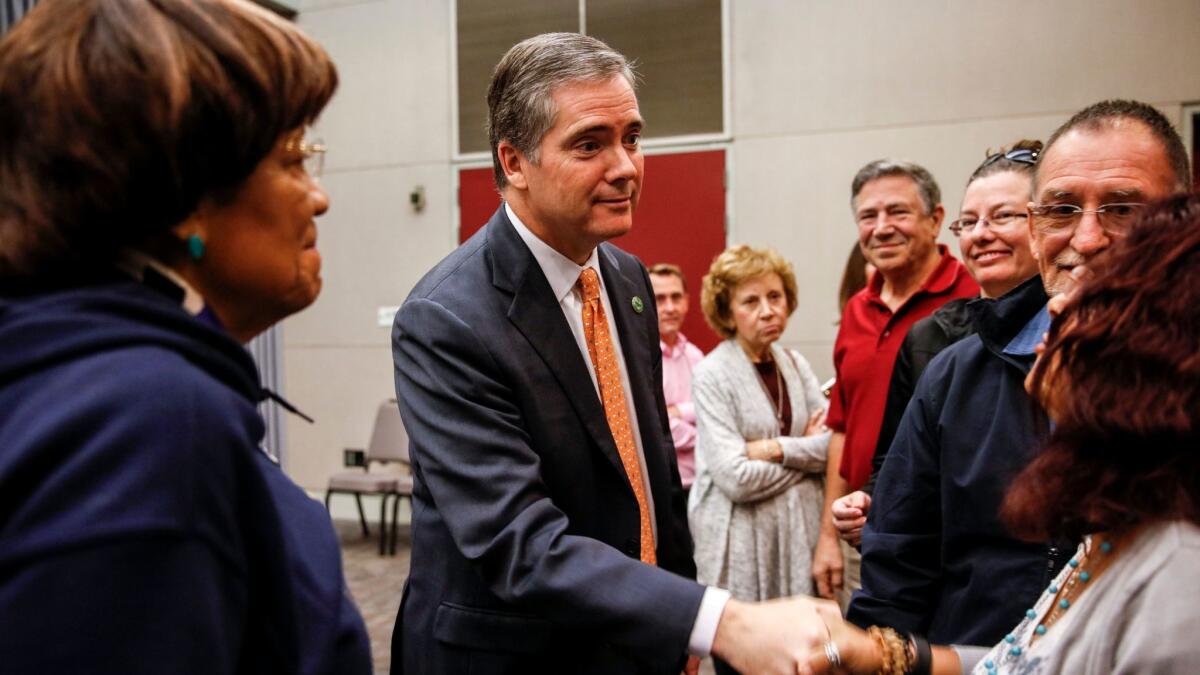Former Republican assemblyman joins race to be California’s next governor
Arguing that California is at a crucial crossroads, Republican David Hadley is announcing a bid to be the state’s next governor. The former assemblyman, who voted against Donald Trump in the fall, is a social moderate and fiscal conservative whose 2018 candidacy could galvanize the GOP establishment in a state where it is at a significant disadvantage.
Hadley, 52, is the third prominent Republican to enter the field, joining businessman John Cox and Assemblyman Travis Allen. The Democratic field is similarly crowded. In California, voters choose from all of the candidates during the primary and the top two vote-getters advance to the general election, regardless of party.
“I’ve decided that I can fill an important role in this election, I think we can win this race, I think we can bring important changes and important reforms to California, and I think I’m the right guy to do it,” Hadley told The Times. “We can’t have this race be a debate between a Democrat and a socialist.”
He didn’t specify about whom his remarks were directed at, but the best-known Democratic hopefuls in the race are Lt. Gov. Gavin Newsom, former L.A. Mayor Antonio Villaraigosa and state Treasurer John Chiang.
The last time a Republican candidate was elected statewide was more than a decade ago, and Democrats have a 19-point edge in voter registration. The Democratic gubernatorial candidates have a head start and have raised more than $20 million combined.The state’s top-two primary could keep a Republican off the November 2018 ballot, a repeat of what happened in the 2016 U.S. Senate race.
But Hadley believes a Republican has a chance to appeal to voters who believe Democrats have gone too far with the Legislature’s recent passage of an increase in the gas tax and vehicle registration fees. and Democrats’ unsuccessful attempt to create a single-payer healthcare system in California.
“On so many issues, the leadership in Sacramento does not reflect the values of the residents of California,” he said.
Specifically, Hadley said he hopes to build a coalition of center-right voters as well as non-Republicans willing to cross party lines. He plans to roll out the endorsements of more than 20 GOP members of the Legislature soon.
Follow California politics by signing up for our email newsletter »
Hadley is a Fullerton native, a businessman who served in the Assembly for two years and a father of four who lives in Manhattan Beach with his wife Suzanne.
He opened a gubernatorial exploratory committee in the spring, but held off on making it official until now. The announcement is coming just after San Diego Mayor Kevin Faulconer, who was facing pressure from national and state GOP leaders to enter the race, announced he would not run.
Hadley declined to say whether Faulconer’s announcement influenced his decision, but the mayor is better known among voters and donors. And they would have been vying for the same types of supporters because of similar ideological profiles and demonstrated crossover appeal being elected in places where Democrats outnumber Republicans.

In 2014, Hadley won the South Bay Assembly seat by a 0.6% margin, ousting Democrat Al Muratsuchi in a low-turnout race. Two years later, Muratsuchi reclaimed the seat with an eight-point margin of victory, thanks to energized Democratic turnout because of the presidential election in the Democratic-leaning district.
Hadley did not cast a long political shadow during his time in Sacramento, though he did successfully push through bills to increase transparency of school employee misconduct and roll back civil-asset forfeiture laws.
Hadley occasionally broke with his party on issues such as renewable energy, a reflection of voters’ views in his swing district.
Republican donors have been reluctant to fund statewide candidates in California given the party’s losing track record. But that may change in 2018, because there are seven congressional races in the state that are crucial to GOP efforts to retain control of the House of Representatives. GOP leaders believe it is key to have a strong candidate at the top of the ticket to drive Republican turnout and protect both those incumbents and their congressional majority.
Some of the establishment donors and power brokers who would have backed Faulconer are likely to give Hadley a look. He has existing ties to some, notably Charles Munger Jr. The GOP mega-donor’s independent expenditure committee spent more than $1.4 million trying to boost Hadley in his unsuccessful reelection race.
Muratsuchi worked hard to tie Hadley to Trump, despite Hadley openly opposing Trump’s presidential bid. (He voted for libertarian Gary Johnson).
If Hadley advances to the general election in the gubernatorial race, he runs the same risk given the polarized climate in a state Trump lost by more than 4 million votes.
Hadley said he doesn’t intend to turn the race into a referendum on the president.
“This is not going to be a campaign about reacting to every tweet or real or made-up outrage out of Washington,” Hadley said, noting that Trump is not responsible for the state’s high level of poverty, failing schools and high taxes. “This is going to be a campaign focused on the future of California.”
For the latest on national and California politics, follow @LATSeema on Twitter.
ALSO
California’s 2018 governor’s race is going to be big. Find out who’s in and what’s next
Billionaire Tom Steyer is spending millions for Democrats. What will he get out of it?
Live coverage of California politics
More to Read
Get the L.A. Times Politics newsletter
Deeply reported insights into legislation, politics and policy from Sacramento, Washington and beyond. In your inbox three times per week.
You may occasionally receive promotional content from the Los Angeles Times.










